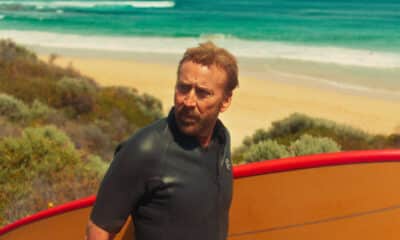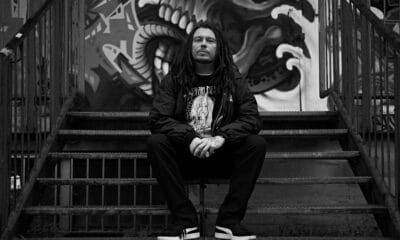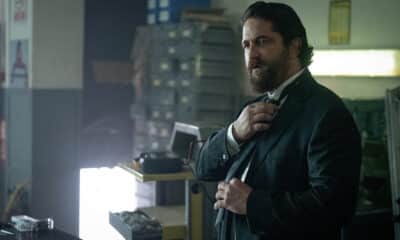
Thomasin McKenzie in ‘Leave No Trace’
One of the best films of the year comes to UK cinema screens this week following a jaw-dropping world premiere at the Sundance Film Festival in January and then a European drop at Cannes at the beginning of May. Leave No Trace features a career-best performance from Ben Foster and a breakthrough turn from Thomasin McKenzie as teenager Tom who is living off the grid with her severely tormented father, Will (Foster).
We caught up with McKenzie and director Debra Granik in Cannes to talk about this fantastic film, how it was crafted and how they managed to turn heads on he festival circuit.
How did you guys work together to achieve the intensity of this stunning piece of work?
Thomasin McKenzie: I don’t know. Debra is a really amazing person to work with. Debra has got a lot going on in her mind and I can really see her thinking and here the gears turning. She’s a real collaborator and very generous in accepting and testing other people’s ideas. She’s a really special person to work with.
Debra Granik: We shot, rain or shine. They were in a forest. They were wet. They had to light their fires. They worked with a skills trainer and she was very masterful. [Both Ben (Foster) and Thomasin] took it to heart. Ben and Thom immersed and used those tools. They was a lot for them to do and they to communicate in ways that were uncharted; they had to really accomplish things in those scenes. One of the things this skills trainer brought up was ‘clicking’ – she had had the very unusual life where she had worked with bushmen in a prior project and so she offered that as a technique that they could communicate with that wouldn’t be so detectable – but they would hear each other. You guys really built on them and made them your own.
Some of the intensity I would attribute to the fact that you were always thinking about the character and asking yourself if certain lines were in sync with what you were feeling at the time. We also shot, kind of in order. That was a dream of mine and I had admired some British filmmakers for this but it is very hard to execute on a financial level. This was not a big budget film but the producers were able to assist me in making that happen and it was a gift. Ben and Thom were able to have this easy time together when life was easy and then got more uncomfortable when you were removed and repatriated, right? Then things got rugged – you had a hike in those forests.
Thomasin: You could really see, or at least I could see the arc in the story from where it started with Tom and Will being happy with their lives and then things get slowing more intense until it all just breaks apart. You could see Tom grow. When I was watching the film it was a really odd sensation watching myself getting older and seeing my features get darker – my hair got darker – it was really weird. Because we shot in order it meant that there was a real difference from beginning to end.

Ben Foster with Thomasin McKenzie in ‘Leave No Trace’
Debra, what is your fascination with this kind of story?
Debra: Well, I would say that people go against normative constructs. When they have the audacity – the thought, or the need to differentiate or to pull out, opt out – I wonder how they are going to do that. I want to know why they do it – I want to know what they are seeking. Wondering and seeking are timeless but when they do it in contemporary times in your own country I feel that I’m never not going to be interested. My heart will also go out because it doesn’t seem easy.
Going back to that intensity question, I just realised something. We had some real people represent themselves in the film – non-professionals if you want to call them that, or people from everyday life. The beekeeper, for example, was a real beekeeper and she felt something from Thom. She said to Thom very early ‘I feel that you are someone who can handle bees – that bees would be comfortable around you. Your pheremones, your quietness, your gentleness.’ So, the intensity was jacked up by this real encounter – this woman from Portland sensing something off of Thom and then deciding to push that further into the scene. Intensity comes from different sides. They are gifts to a film but they are usually due to making sure that a lot of ingredients are brought in that aren’t just in the script. That level of intensity would be hard to bring in from an artificial environment – from a set – from everything being absolutely precise. That would be a different kind of filmmaking.
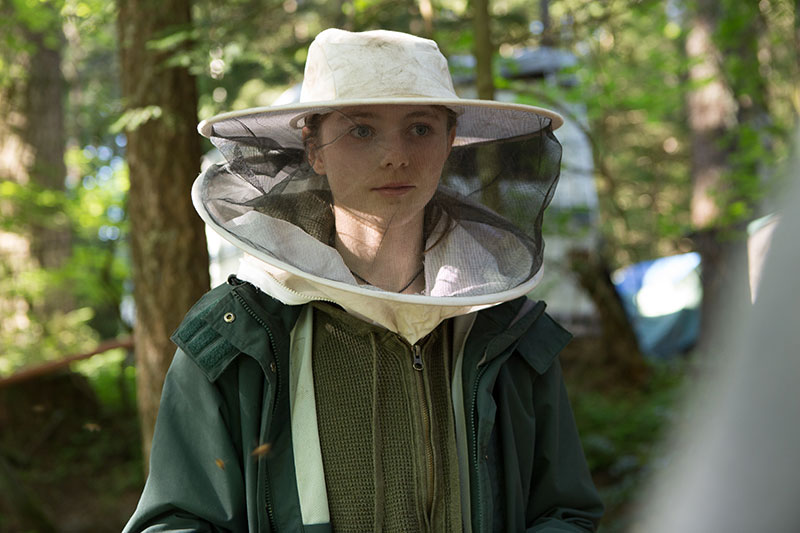
Thomasin, what was the most challenging part of the role for you?
Thomasin: It wasn’t challenging playing the role. I think the ending of the story in that they had to split up and they could no longer live with each other happily – that was definitely challenging because it made me think of my dad and made me think what I would do if I had to leave my dad behind. That’s the part that’s challenging to the audience as well – it really resonates with people and makes them think about what they would do if they had to abandon someone who they loved. When we were filming it there was nothing [challenging]. I was happy to go to work and excited. I didn’t;t think ‘I don’t want to go… I don’t want to do that again.’
It seems that this is a great time to be a female director in the industry. Debra, I would be keen to get your insight into it. Are you able to do things that you couldn’t do before? Is it becoming easier now?
Debra: My progression, because I work on the small side of things in terms of financials, because I am a cultural worker who doesn’t need a lot of resources to do the work, I was steady on my path. I also had really wonderful male collaborators. One of the big keys of this is that it’s an enzyme – it’s to work with men who like working with women. It’ a very enriching situation. I have not tried to be in bigger systems that did close the doors before. I fell like I’m steady on my force and feel grateful for the movement and the discussion because to not ask questions every several years about business as usual is to basically wither up. No time in history can you just keep going with business as usual. It is an exciting time but I feel that some of this movement has been geared more towards the industry and for better or worse stand outside the industry.
Why did you want to portray these particular characters at this particular time? What does it say about America today?
Debra: I think that characters that are attempting to live with less, characters that are asking ‘what does it mean to opt out of large parts of ubiquitous and hegemonic digital society?’ I’m wondering, who the hell can do that? They are going to intrigue me but it is a time of deacquisition, it is a time of understanding that obligatory happiness doesn’t come. Mass consumption culture beats its people down, you know? People become weary and feel at a great loss. Some people will stay embedded and hooked – it’s a goal to keep going – and for others, it will be this desire to say enough, or time’s up? I want to see what it would be like to
Is it increasing in America? Living off the grid?
Debra: I think it is increasing, yes.
Thomasin: People are trying harder to leave less of a footprint and live more sustainably.
Debra: The tiny house movement is real and that’s people who say ‘I would like to live sanely – I want to have a shelter – I need those basic needs to be met’. There’s none of us that can eshue that completely. I think that if I was granted that space to be able to just keep it ‘this big, this tiny’, would it be possible? That’s what a character asks in the film – ‘what about one tree? If I were able to keep my habitat to one space?’
Thomasin: Rather than a whole forest.
Debra: At the very least, it’s a question that has had to be asked as soon as there’s been a technological revolution – whether it was the initial industrial or subsequent revolutions, people have had to ask ‘is this the merry-go-round I want to be on?’

Did you look at the project as an interpretation of the real events on which the story is based?
Debra: This is our interpretation. What is known about the family on which the article was based was extremely small. All that’s known is that they lived there for quite a few years, she read very well – obviously, someone had taught her. The rangers were fascinated as to why they hadn’t seen them. They built a fire pit where the smoke went through a tunnel – sort of a native American approach – called smokeless fire. They had done a bunch of things that ensured that they wouldn’t be detected and the rangers were pretty much incredulous. The case was sealed – when it involves a minor they seal the case so that she doesn’t have to go the rest of her life with being publicly exposed. To be of interest means to be scrutinised, to be scrutinised means to be looked at, to be looked at means to be public.
Thomasin: That’s something that is touched on in the movie when Tom says ‘and then they won’t ask many questions – the kids at school won’t think I’m weird’. I’m really happy that no one knows what happened to them.
Portland seems to be the epicenter of a lot of things you mention. What makes that city so?
Debra: It’s funny, Portland is a lone strand of trees in a state that can have a lot of right-wing beliefs. It’s an oasis of conscience I would say. They put their lives on the line, a lot of them, in the southern part of the state, for the forests. Call them treehuggers, they are people who are super-committed who are asking if this is something that we really want to do to this valuable, geological gift to the planet. This is a very important rainforest. It stretches from California deep into Canada. It’s not just the United States, it’s northern American – it belongs to a continent – it belongs to the world, and it’s being harvested at a phenomenal rate.
Leave No Trace is released in UK cinemas on Friday 29th June 2018. You can read our five-star review here and check out our interview with Ben Foster over here.

Latest Posts
-


Film Reviews
/ 1 day ago‘Fear Street: Prom Queen’ review: Dir. Matt Palmer (2025)
It has been four years since Leigh Janiak’s Fear Street trilogy took horror fans...
By Kat Hughes -
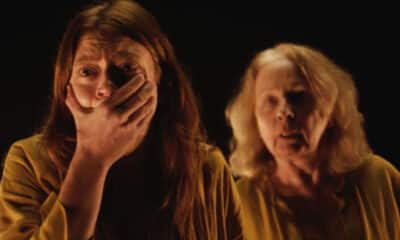

Film Reviews
/ 1 day ago‘The Surrender’ review: Dir. Julia Max (2025)
As Julia Max’s debut feature, The Surrender, unfolds, the inspirations for the film become...
By Kat Hughes -


Film Trailers
/ 3 days agoFirst trailer for Darren Aronofsky’s ‘Caught Stealing’
Sony Pictures has released the debut trailer for Darren Aronofsky’s new film Caught Stealing,...
By Paul Heath -


Film Reviews
/ 4 days ago‘Lilo and Stitch’ review: Dir. Dean Fleischer Camp (2025)
Director Dean Fleischer Camp won audiences over with the fantastic Marcel the Shell with...
By Kat Hughes
